10 jaar
na de door Hillary Clinton en de CIA opgezette bloedige coup (28 juni 2009) is
het intussen al meer dan 60 dagen onrustig in het land, dit als
reactie op het plan om ook op gezondheidszorg en onderwijs te
bezuinigen..... Middels massaal verzet, ook van de beroepskrachten,
is deze bezuiniging van de baan, maar het verzet blijft doorgaan daar de ellende groot is onder het gewone volk, ook
al is er gevaar voor arrestatie waarbij mensen in op VS leest
gebouwde extra beveiligde gevangenissen worden opgesloten......
De internationale neoliberale uitzuigorganisatie IMF heeft een akkoord bereikt met de
regering van Honduras over privatisering van staatsbedrijven, het
programma dat hiervoor wordt gevolgd is door sommigen als 'neoliberalisme op steroïden' weggezet....
De vrouw
van een criticaster van dat programma vertelt dat haar man in de
gevangenis zit, NB betaald middels de Hondurese veiligheidsbelasting,
een belastingsturing die werd gesteund door de regisseur van de coup in 2009, hare
kwaadaardigheid Hillary Clinton, destijds minister van BuZa onder
Obama, waarbij de politie en leger, plus de geheime diensten
kapitalen extra kregen, terwijl de rest van de departementen in feite
moesten bezuinigen, of rond zien te komen van een veel te laag
budget..... De gevangenis waarin de bewuste man vastzit en die op VS leest
is gebouwd, werd betaald uit die veiligheidsbelasting.......
Het
neoliberalisme heeft ervoor gezorgd dat een groot aantal mensen in
diepe armoede is beland, niet voor niets dat velen het land
uitvluchten, als ze dat al niet uit angst voor overheid en
doodseskaders hebben gedaan.........
Lees het
volgende ontluisterende verhaal en lees de interviews (via link) en
begrijp waarom zoveel Hondurese mensen het land zijn ontvlucht,
mensen worden vermoord door doodseskaders die niet zelden uit overheidsfunctionarissen bestaan en zoals al vaak vertoond in
Latijns-Amerika: 'mensen verdwijnen......' Overigens ook drugsbendes zorgen voor grote ellende en vermoorden mensen als waren het insecten..... Bij de protesten die
hebben geleid tot het stopzetten van de bezuinigingen op onderwijs en
gezondheidszorg zijn een groot aantal studenten neergeschoten, als gevolg daarvan is een aantal van hen overleden......
In het hierna volgende artikel spreekt de schrijver over de neoliberale agenda van 'president' Hernandez (JOH), die illegaal een tweede termijn dient met steun van de VS, echter gezien het verhaal kan je niet anders concluderen dan dat we hier met een fascistisch beleid te maken hebben......
Dat de
mensenrechten met grote platvoeten worden getreden, leek me aanvankelijk overbodig te melden. Alexander Rubinstein van MintPress News(MPN) is de schrijver van het volgende artikel, ook is hij de
fotograaf die de beelden maakte van een veel gebruikt 'protestinstrument' in Honduras: graffiti op
muren en deuren:
A
NEOLIBERAL AGENDA
“The US Got Scared” Voices of the Resistance in Post-Coup Honduras
Members of the resistance in Honduras tell MintPress how a US-backed coup – and the Neoliberalism it brought with it – have impacted their country.
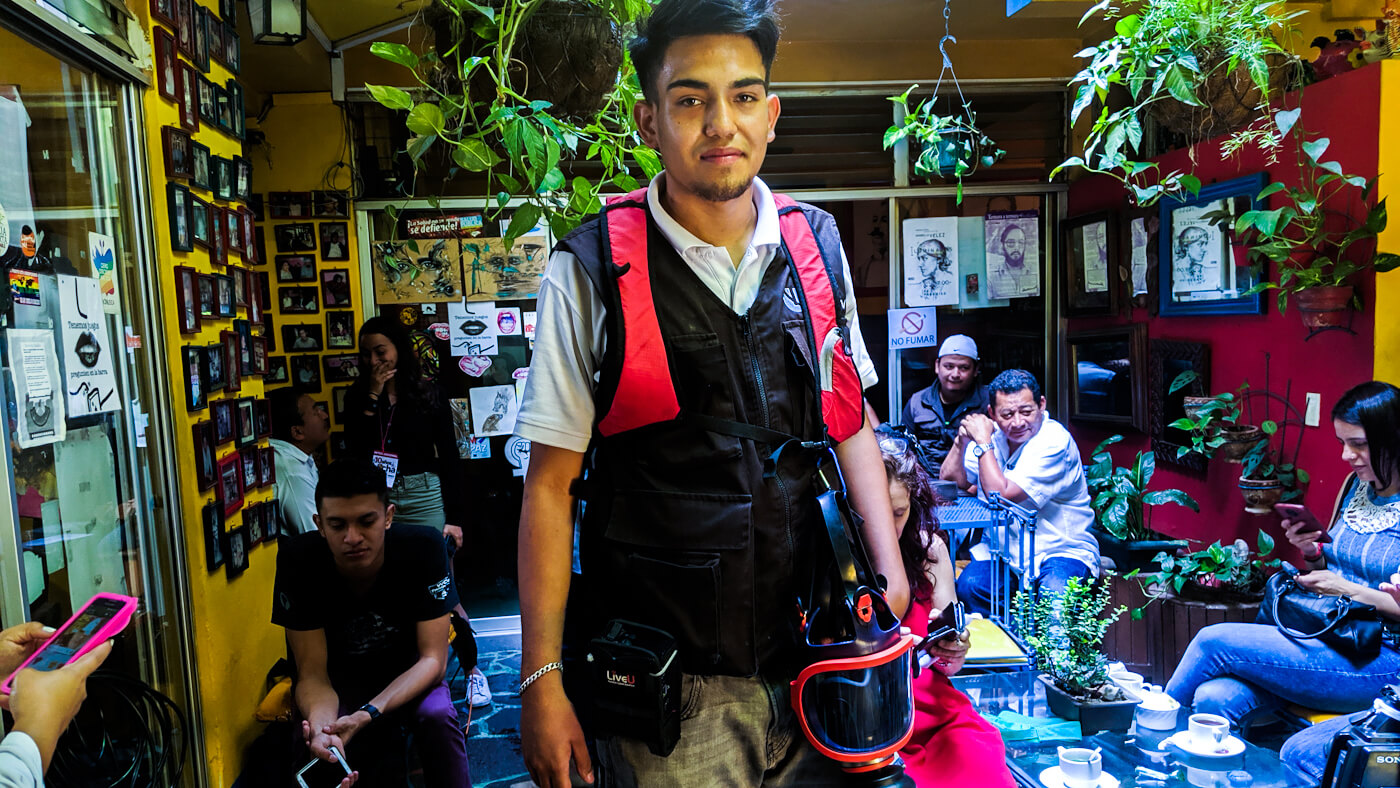
EGUCIGALPA,
HONDURAS — MintPress News went to Honduras and
spoke with a number of leaders of the Honduran resistance amid a
66-day uprising over a neoliberal austerity deal reached between the
government as the country marked the 10-year anniversary of the
U.S.-backed coup d’etat.
Last
Thursday, the Honduran government passed a privatization law, the
run-up to which had triggered uprisings challenging the mandate of
President Juan Orlando Hernandez and protesting the implementation of
a privatization deal reached with the International Monetary Fund
(IMF) — a deal kept secret until this week. The battle against it
was fought tooth and nail, with average Hondurans following the lead
of healthcare and education activists.
MintPress has
obtained a copy of the law. The document details the government’s
plan to sever 6 billion lempiras ($242 million USD), and includes
instituting a maximum wage on public sector contract “technical and
professional” workers amounting to $2,426 a month, but promises not
to cut healthcare and education. An agreement with the IMF over the
state-run electrical company remains in question.
What
is known is that the deal consists of more of the same neoliberal
remedies that have already devastated Honduran civil society. One
person interviewed by MintPress called the approach
“neoliberalism on steroids.” And she would know: her husband is a
political prisoner sitting in a U.S.-designed maximum security
facility. The prison was paid for under the Honduran Security Tax, a
program backed by former Secretary of State Hillary Clinton that
bankrolls the military and police while the rest of the government is
gutted.
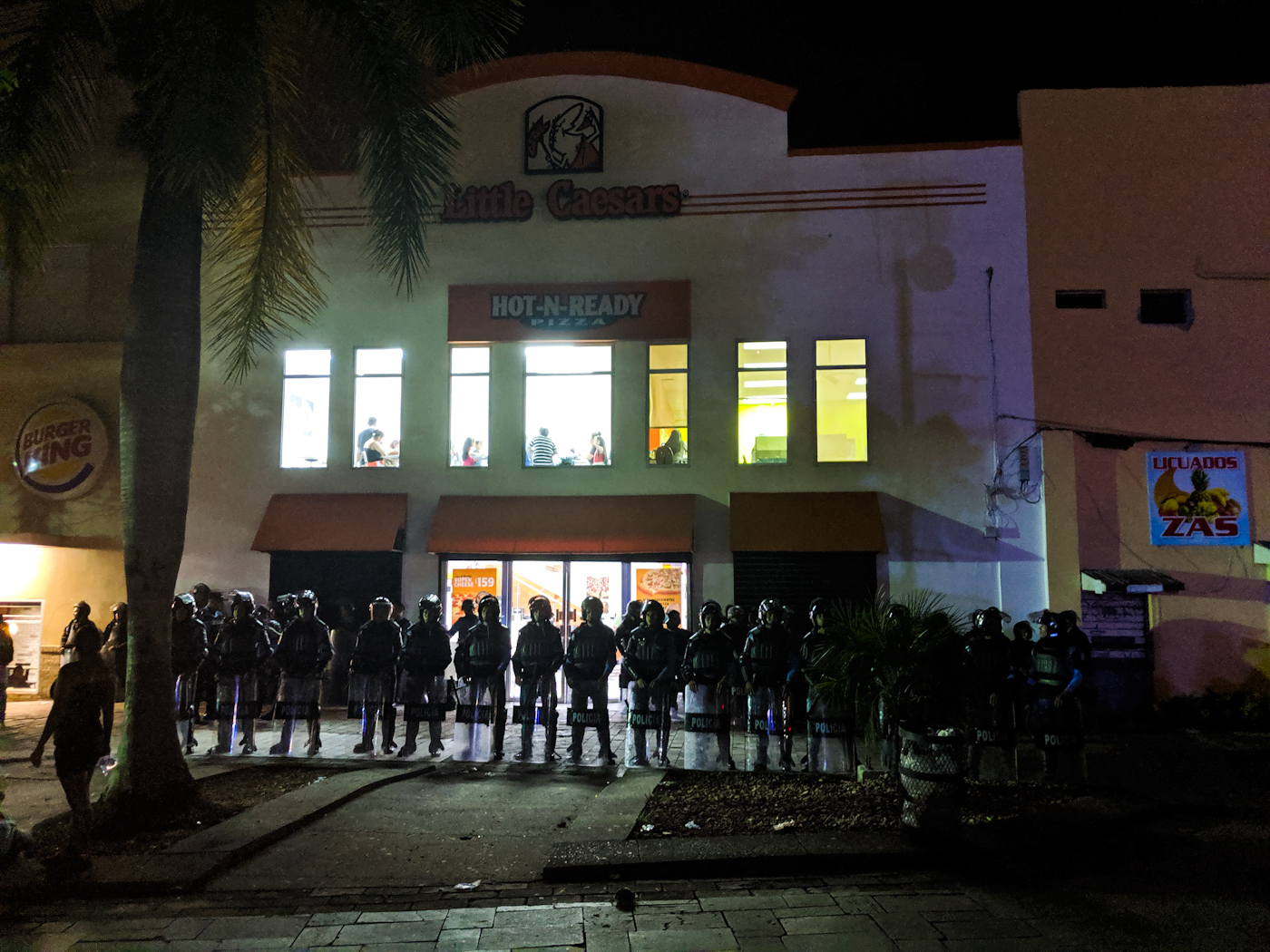
Photo | Alexander Rubinstein
Adrienne Pine, a Professor of Anthropology at American University in Washington and expert on Honduras, told MintPress:
“The fact that education and healthcare were left out is a pretty big win for the movement because that is what they were planning to cut, and the healthcare and education workers who have led this struggle against this have prevented those cuts even though there has been this very radical reduction in public spending.”
On
May 6, the IMF announced it
had reached a “staff level agreement” that was believed to be
targeted towards healthcare, education and more. That same day,
protests started breaking out.
But
as news emerged on Tuesday of the deal becoming law, the IMF also
announced its approval of a plan to restructure the public electric
company and said it would give the Honduran government $311 million
in loans over the next two years. Around the same time, a fresh
corruption scandal was unfolding at the electric company. Professor
Pine explained to MintPress:
“ENEE [the Honduran public electric company] has already been subject to privatization measures over the past few years that have significantly weakened it. Problems in the ENEE have to do, at their root, with the privatization itself, but right now it looks like the IMF and the U.S. are justifying the privatization by using examples of corruption at the agency rather than addressing the underlying structural issues.”
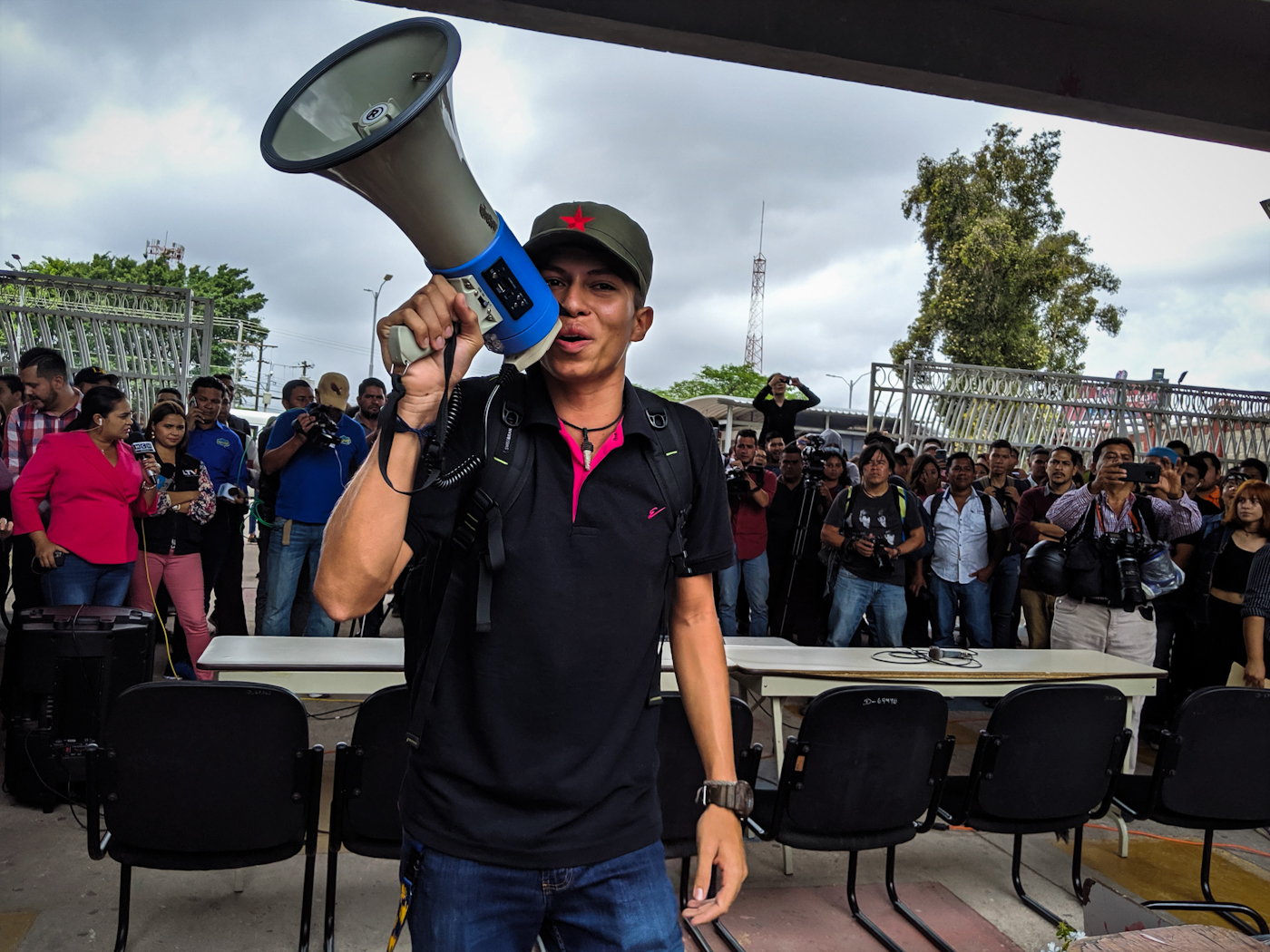
The
resistance in Honduras fought off further privatization of health
care and education in a struggle that left piles of students shot and
scores of people killed, as well as resulting in the political
imprisonment of a young man who is accused of fueling a fire
at the U.S. Embassy in the capital.
Romel Valdemar Herrera Portillo, 23, sits in a military-run prison,
designed by the United States, called La Tova alongside political
prisoners Edwin Espinal and Raúl Álvarez.
In
this article, MintPress will feature exclusive
interviews not just with leaders of the Honduran resistance but also
with people who have been directly affected by the coup and all that
it has brought.'
Ten
years of resistance
The
history of the past decade in Honduras is among the most telling
examples of U.S.-backed regime change in the Western Hemisphere. A
powder keg for the migrant crisis that popped up under Barack Obama
and worsened under Donald Trump, the military operation that deposed
leftist reformer Manuel Zelaya from the presidency informs Honduran
life at every level today.
MintPress
News traveled to Honduras around the 10-year anniversary of
the coup d’etat, speaking to a range of leaders of the resistance
against the National Party, which has dominated politics in the
country since the coup. The National Party is led by President Juan
Orlando Hernandez (JOH), a widely reviled neoliberal leader believed
to be involved in drug trafficking, electoral fraud and death
squads.
The
post-coup neoliberal policies ramped up under JOH’s reign have
rendered Honduras a playground for the business elite and drug
cartels and brought the poverty rate to levels unrivaled in the
region. Disappearances and lethal violence from police, private
mercenaries and drug cartels have also skyrocketed.
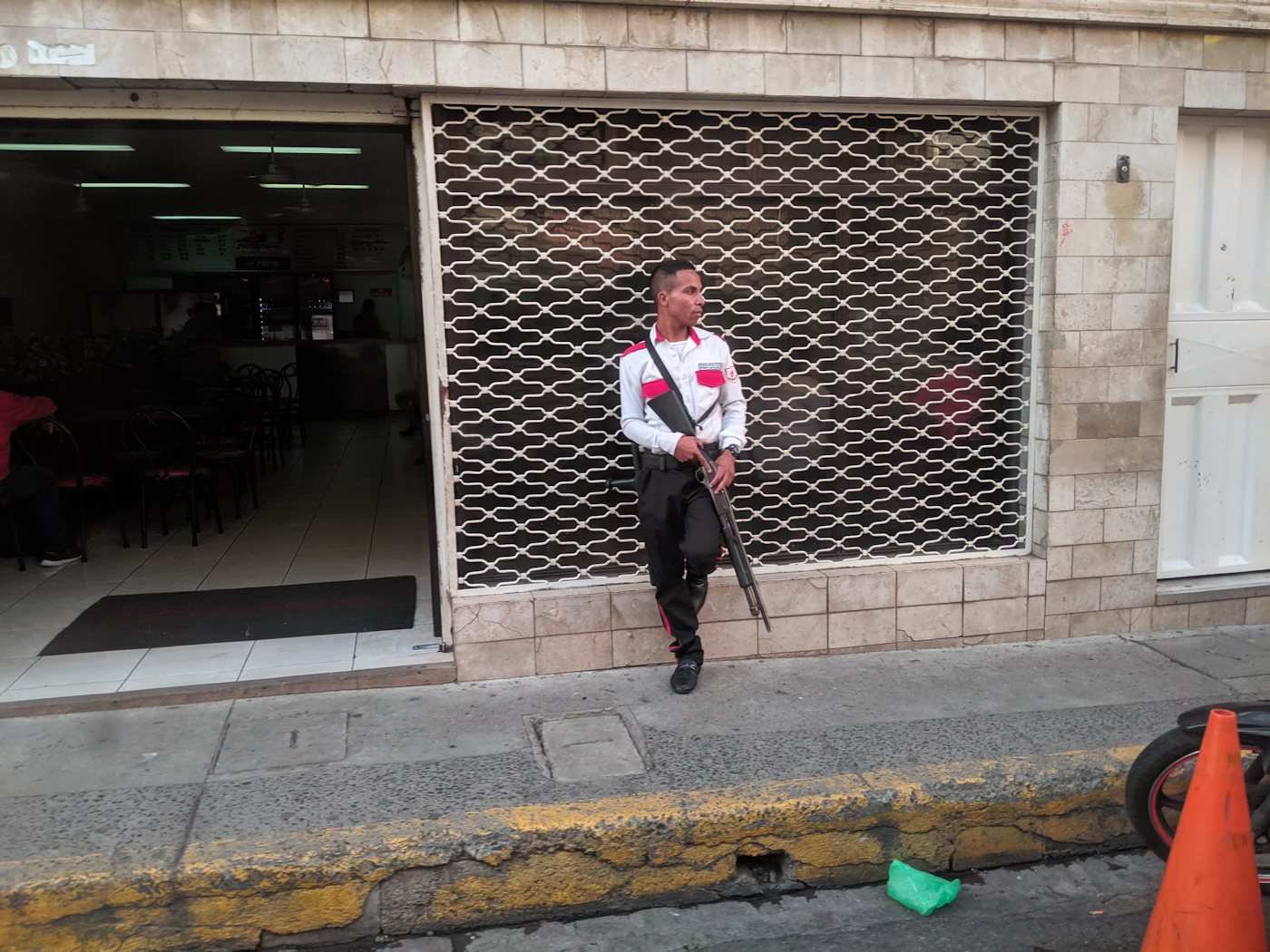
Revelations
that JOH has been under investigation by the Drug Enforcement
Administration (DEA) since 2013, according to U.S. federal court
documents released this year, came as little surprise to many in the
resistance; JOH’s brother is himself in prison in the U.S. on drug
trafficking charges. But it did pour salt on fresh wounds, as the
United States backed JOH’s re-election in 2017, even though the
Honduran constitution explicitly forbids second terms.
While
in Honduras, MintPress examined
the effects of the coup from multiple angles, including: cuts to
education; repression against students and teachers; cuts to the
healthcare sector; the political development of Hondurans; electoral
fraud; death squads linked to big business; the conditions of
political prisoners and the plight of human rights workers; and the
effects of neoliberalism on the healthcare sector. MintPress also
looked at the role
of creative culture in
the resistance.
As MintPress previously reported,
staff journalist Alex Rubinstein was detained immediately upon
landing in the capital, Tegucigalpa. It was “a testament to the
government’s unease” around the anniversary of the coup and in
the face of more than 50 days of active
uprising.
I was just let out of detainment at the airport in the capital of Honduras. They didn't explain why the detained me, just asked a bunch of questions.
Stay tuned to @MintPressNews as we approach the 10yr anniversary of the US-backed coup in this country. Much more to come
Stay tuned to @MintPressNews as we approach the 10yr anniversary of the US-backed coup in this country. Much more to come
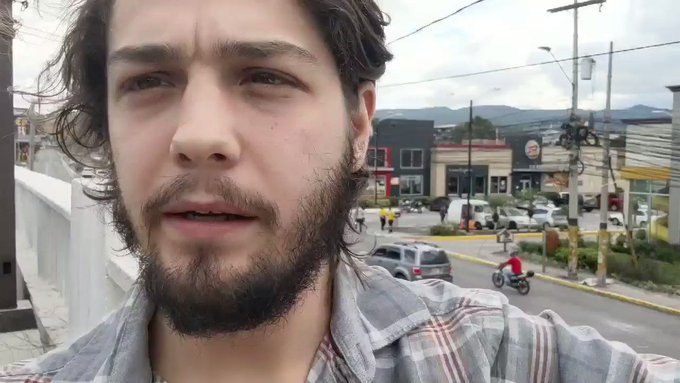
(dit is een still van een 2 minuten video die ik niet over kan nemen, zie het origineel)
MintPress spent
nearly a week in the capital, Tegucigalpa, a city that is both
militarized and yet ruled by crime at night, a dynamic that makes the
often cozy relationship between the state and organized crime
palpable throughout much of the city. The prevalence of anti-JOH and
anti-National Party graffiti appears as a glimmering of an uprising
in a city otherwise divided into quarters of poverty and opulence:
from poor, Libre strongholds like El Carrizal to
areas where Burger King and Little Caesar’s are second and third
only to Juan Orlando. United States colonialism is, basically,
omnipresent. American fast-food restaurants, mostly a luxury for the
country’s tiny middle class, operate tax-free in the country, while
those who can’t afford a Big Mac get squeezed on their electricity,
for example.
The
streets of Tegucigalpa tell the story of the resistance, to a degree.
One tag in the city refers to the use of graffiti as a means of
communicating a message: “When justice is silenced, the walls
speak.”
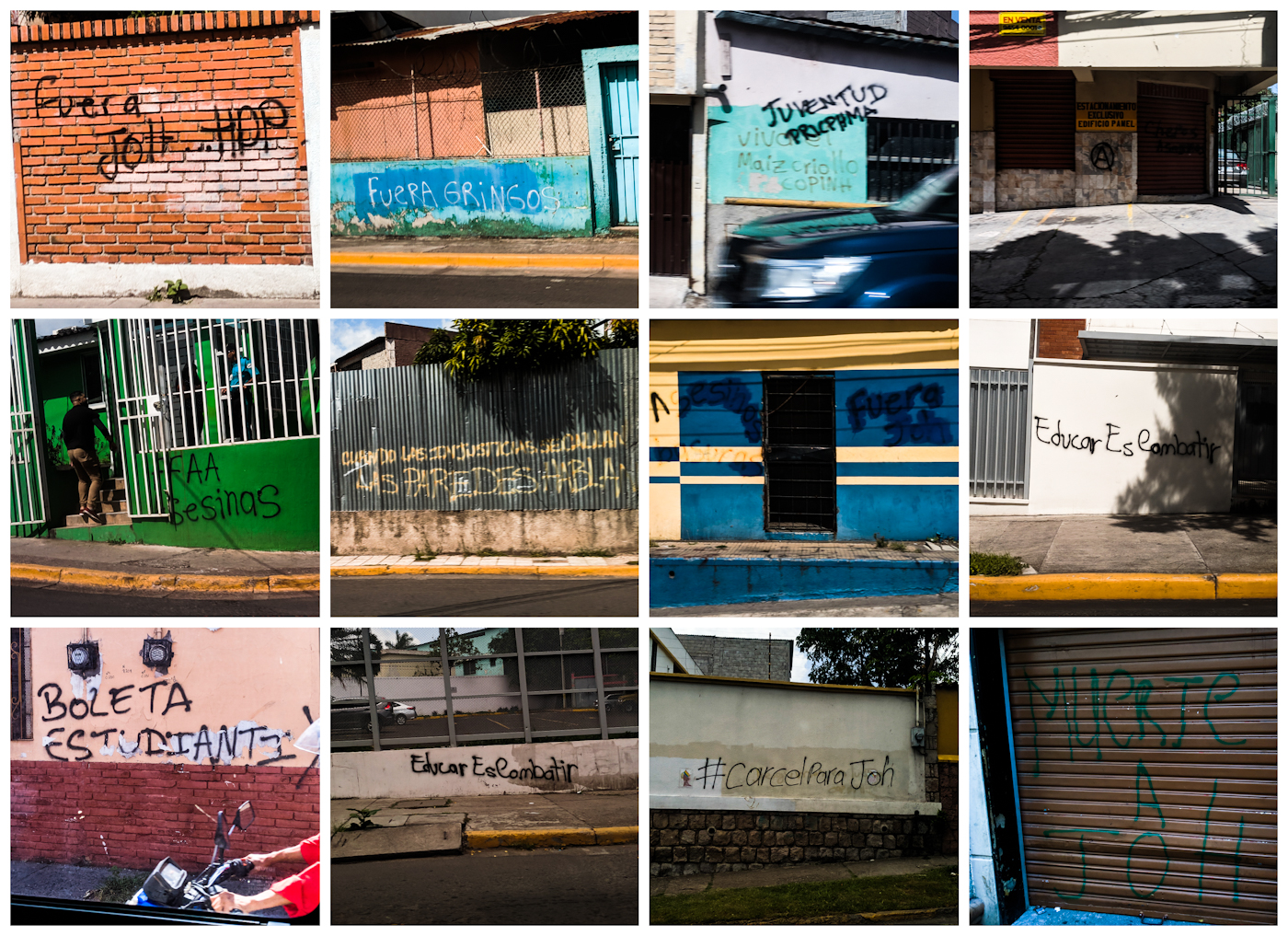
Photos | Alexander Rubinstein
What
follows are excerpts of MintPress News interviews
from a range of leaders of the resistance against JOH.
======================================Zie ook:
'BBC volkomen krom over de vluchtelingen uit Honduras die wel degelijk door Trump met geweld worden bedreigd'
'Door VS gesteunde bewind in Honduras heeft de staat van beleg afgekondigd........'
'VS heeft Hondurese speciale eenheden getraind die protesten tegen een waterkrachtcentrale gewelddadig hebben neergeslagen......'
'Hillary Clinton mede verantwoordelijk voor moord op Berta Cáceres...........'
'Hondurese activiste ontvoerd en vermoord (alweer...), met instemming van de VS.........'
'Berta Cáceres voorvechter gelijke rechten en milieuactivist vermoord in Honduras'
'Bolton geeft toe dat de VS een fascistisch beleid voert......'

